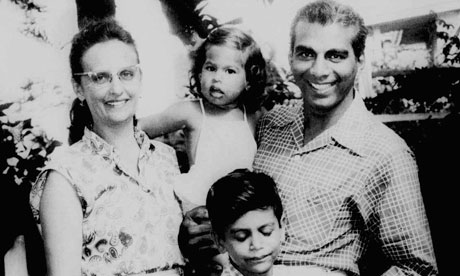MI5 files reveal details of 1953 coup that overthrew British Guiana's leaders

Secret documents declassified on Friday by MI5 reveal in detail how in 1953 the UK under prime minister Winston Churchill overthrew the elected government of British Guiana – now Guyana – because he feared its leftwing leader and his American wife would lead the British colony into the arms of the Soviet Union.
The documents reveal how British spies kept up intense scrutiny on Cheddi Jagan and his wife Janet, who together founded the People's Progressive party (PPP) to campaign for workers' rights and independence from British rule for the sugar-producing colony in northern South America.
The UK had agreed a new constitution in the early 1950s which allowed British Guiana's political parties to participate in national elections and form a government, but maintained power in the hands of the British-appointed governor.
Christopher Andrew, MI5's official historian, said the files provide new details of the coup and "further evidence that MI5 played a more important part in British decolonisation than is often realised".
The Jagans – a US-educated former dentist and his wife, born Janet Rosenberg in Chicago – seem an unlikely threat.
But the 39 folders of files released by the National Archives are crammed full of tapped phone conversations, intercepted letters and accounts of physical surveillance over more than a decade.
In 1951, the year after the Jagans founded their party, an MI5 agent based on the nearby island of Trinidad described them as "something new in British Guiana politics".
"Both are able and intelligent and the mere fact that Janet Jagan is white, young and not unattractive in appearance lends considerable interest to her activities and those of her husband," he said.
To British authorities, the Jagans were a headache. To the Americans, they were a potential communist threat on America's doorstep.
MI5 concluded that their party was "not receiving any financial support from any communist organisation outside the country".
Nonetheless, amid worsening strikes and unrest, Britain grew unhappy with the Jagans' "disruptive antics".
After the party won a huge majority in British Guiana's 1953 election, making Cheddi Jagan prime minister, Churchill decided to act.
"We ought surely to get American support in doing all that we can to break the communist teeth in British Guiana," he wrote to his colonial secretary.
In the end, Britain acted alone, mounting a military operation codenamed Operation Windsor. Churchill dispatched a warship, HMS Superb, and brought hundreds of troops by air and sea to secure key sites.
On 9 October, Britain suspended British Guiana's constitution, fired its legislators and arrested the Jagans.
The surprise military operation went according to plan. The Trinidad-based MI5 officer noted with quiet satisfaction that "it was obvious that the PPP leaders had no idea that the constitution would be suspended or that they might be arrested".
And the spy threw in a note of thanks for the women who helped the army to march on its stomach.
"I might add in parenthesis that catering arrangements for the airborne troops during their halt in Trinidad were carried out by Mrs Beadon, wife of the commissioner of police, Mrs Rahr, my wife and Joyce Huggins … and I understand that no less than 600 large sandwiches were cut by these ladies," he wrote.
An outraged Cheddi Jagan appealed by telegram to Britain's opposition Labour party for help. Leader Clement Attlee replied curtly: "Regret impossible to intervene."
For the next three years, British Guiana was ruled under emergency powers by the British governor and appointed officials, and the Jagans were kept under house arrest and strict surveillance.
In the years that followed, MI5 softened somewhat toward Cheddi Jagan, acknowledging that he was an astute and popular politician – though the agent based in Trinidad strongly disliked Janet Jagan, whom he described as a committed communist "uncompromising in her hatreds".
By the 1960s, Britain's spies worried that the Jagans would turn to newly communist Cuba, possibly making their country a base for Latin American revolutionaries.
"If the Jagans remain in power after independence and if their activities and views remain unchanged, they will represent a threat to the stability both of British Guiana itself and of the neighbouring territories," the officer wrote.
Andrew said it was clear from previously released official documents that successive British governments "gave in to pressure from the White House to allow the CIA to use subterranean means to ensure that the first leader of independent Guyana in 1966 was not Cheddi Jagan".
He added in a podcast for the National Archives (begins 5m 38sec in): "In most British colonies, there was a relatively friendly transfer of power to independent governments. British Guiana was a notable exception."
The Jagans remained a major force in Guyanese politics and Cheddi Jagan became prime minister again in 1961, when the batch of MI5 files ends.
After the cold war ended, Cheddi Jagan served as president of Guyana from 1992 until his death in 1997. His wife succeeded him between 1997 and 1999. She died in 2009, aged 88.
